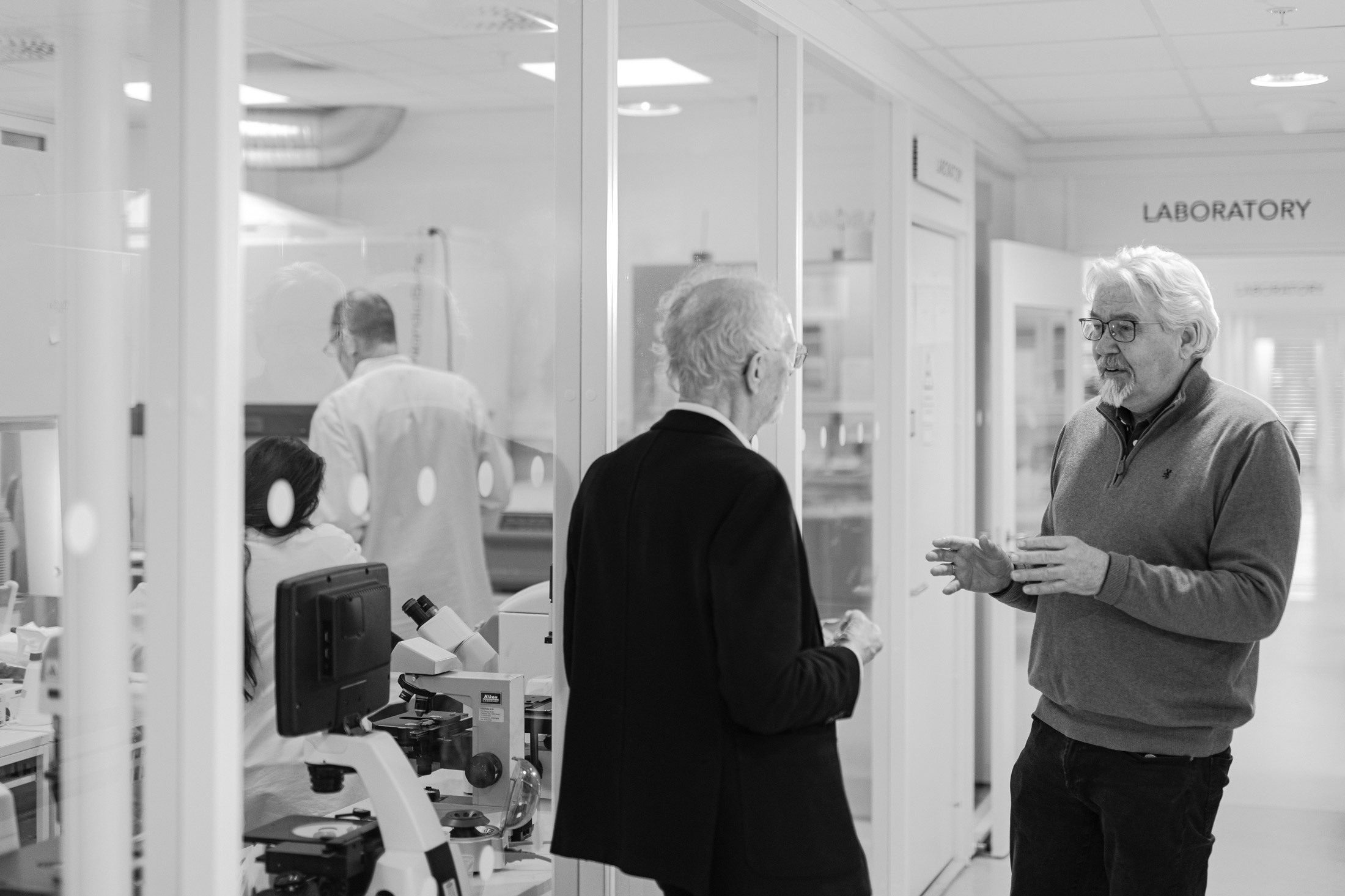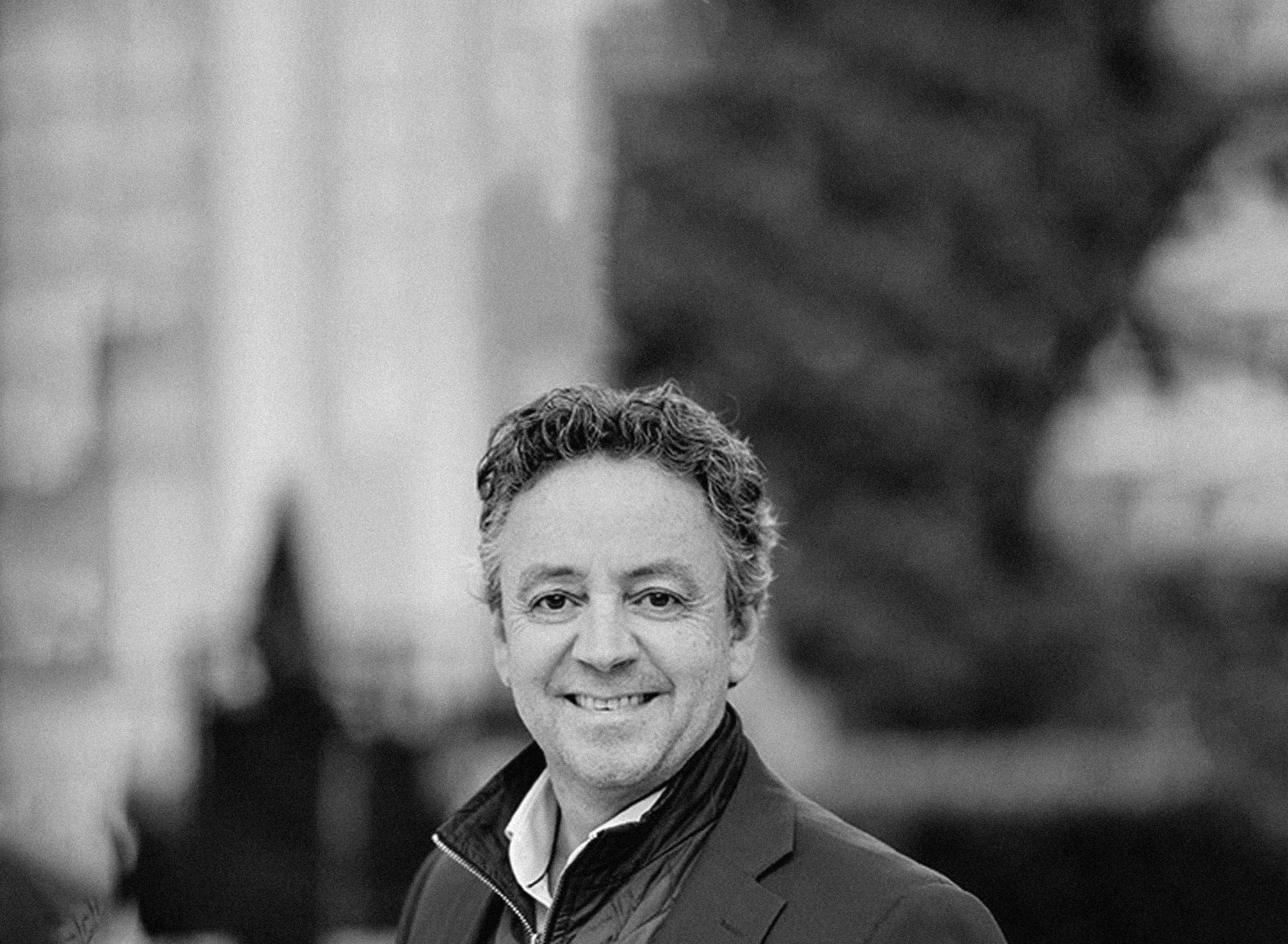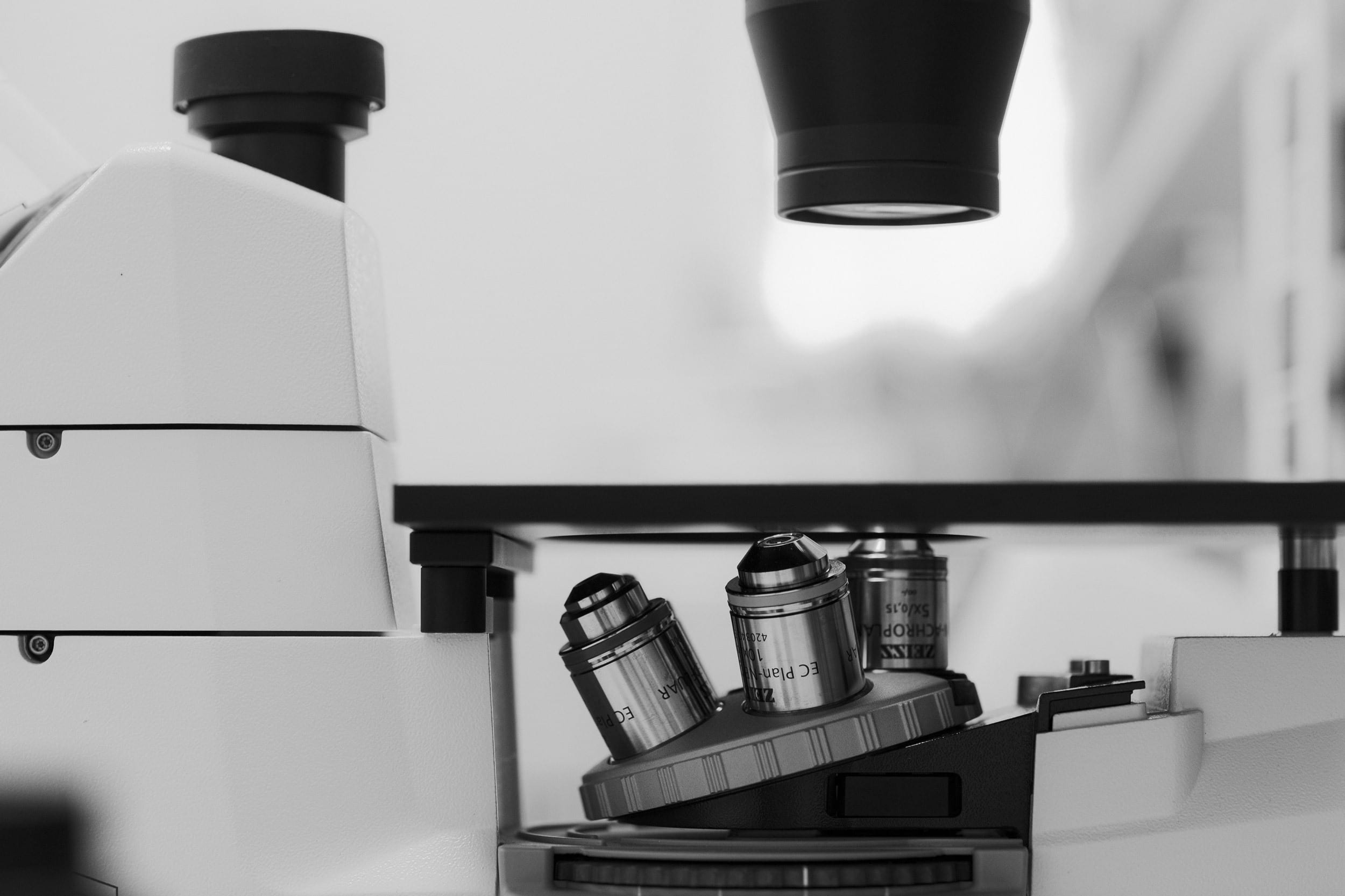Radforsk Innovation
Breaking new ground for groundbreaking innovations


Radforsk Innovation designs, establishes and develops innovative ecosystems and infrastructure that contribute to ground-breaking research and innovation in the field of cancer.
Our two primary goals for Radforsk Innovation are to secure access to new, innovative ideas that can develop into ground-breaking projects and companies, and to provide our portfolio companies with the best conditions for growth. For Radforsk Invest, this means getting:
The best possible access to new ideas and research that can form the basis for company establishment and investments
The best possible development conditions for Radforsk Invest's portfolio companies, such as infrastructure, access to talent and other framework conditions.
When we see the potential in a new field of research or discover a bottleneck in a system, we exploit the potential or solve the bottleneck. We step in directly with investments and research funds, alone or together with others. We connect people, companies and technologies, national and international - and our driving force is always to develop the best possible treatment for cancer patients.
Below you will find an overview of our innovations - those we are proud to have already built, and those we are excited to develop further.

Campus Radiumhospitalet
Campus Radiumhospitalet is an epicenter for cancer research and development in Norway. Overall, Campus Radiumhospitalet strengthens Norway's position in cancer research and contributes significantly to both the European and global efforts to develop new and more effective treatments for cancer.
In our history you can read more about this area at Montebello in Oslo and how it has developed from when Radiumhospitalet opened its doors in 1932 to today, and what are the future plans on Campus.
Below we have described the various parts that make up the Campus, and make the area completely unique:
-
Oslo Cancer Cluster Innovation Park
Oslo Cancer Cluster Innovation Park, which opened in 2015, houses parts of Oslo University Hospital, the Cancer Registry of Norway, Oslo Cancer Cluster Incubator, large and small companies, and Ullern Upper Secondary School.
Oslo Cancer Cluster Innovation Park
The park is located beside the Norwegian Radium Hospital and the Institute for Cancer Research. This facilitates direct contact between private enterprises and the research and treatment that is carried out here, which serves as a catalyst for collaboration between the private sector, research and clinical trials. Here, there are specialised laboratories, shared offices and arenas that promote innovation and the commercialisation of new cancer therapies.
The prime movers behind the innovation park and the integration of Ullern Upper Secondary School were Jónas Einarsson and Kaare Norum, who were also behind Oslo Cancer Cluster. As far as we know, this type of concept is still highly unusual in Norway, and both politicians and others engaged in developing innovation environments use our model as inspiration when developing corresponding building complexes elsewhere.
The Innovation Park was soon fully occupied and interest in becoming part of this milieu keeps increasing. Einarsson has, recently also together with Thomas London of Oslo Science Hub, therefore been working hard to expand the park.
Construction work on the first new building started in summer 2023 and is scheduled for completion in 2025. The new building will have around 12,000 sq. m of floor space and will, among other things, house Thermo Fisher Scientific's research department, the Aktiv mot Kreft (Active against Cancer) foundation and the companies in Oslo Cancer Cluster Incubator that are working on cell therapy.
-
Oslo Cancer Cluster Incubator
Oslo Cancer Cluster Incubator started on a modest scale when the management of Radforsk and Oslo Cancer Cluster shared premises at Lysakerlokket between 2010 and 2015, before moving to Oslo Cancer Cluster Innovation Park.
Oslo Cancer Cluster Incubator
The Incubator offers resources, networks and know-how that is essential for new and growing enterprises in the industry, such as laboratories with specialised machinery and equipment, offices, meeting rooms and dedicated staff.
Because of shortage of space at Montebello, some of the companies are based at Rebell in central Oslo pending the expansion of the Innovation Park.
-
Oslo Science Hub
In 2030, yet another expansion of Campus Radiumhospitalet is scheduled for completion.
Oslo Science Hub
Oslo Science Hub represents an expansion of Campus Radiumhospitalet with 40,000 square meters and potentially 2,000 new jobs.
Oslo Science Hub will provide Campus Radiumhospitalet with a highly anticipated expansion of space, including office areas, laboratories, a biobank, and a researcher hotel, specifically tailored for international and national actors in cancer research and development.
Additionally, Oslo Science Hub will contribute to transforming the campus into a pleasant micro-neighbourhood with a convenience store, café, restaurants, and a square.
Thomas London (pictured above) is the CEO of Oslo Science Hub. London works closely with Jónas Einarsson, CEO of Radforsk, on this project.
-
Institute for Cancer Research
Since it was founded in 1954, the Institute for Cancer Research has played a key role in both Norwegian and international cancer research.
Institute for Cancer Research
The institute currently has seven research departments and more than 340 employees.
The institute for Cancer Research has strong international research groups in the fields of biochemistry, cell and tumour biology, genetics, radiation biology, immunology and cancer prevention.
Since its establishment, the institute's researchers have cooperated closely with cancer surgeons, oncologists and pathologists. The emphasis on translational research has resulted in a number of clinical protocols based on in-house research. This institute is a key partner in what is known as CCC – Comprehensive Cancer Centre at Oslo University Hospital.
-
The Norwegian Radium Hospital
The Norwegian Radium Hospital, which was opened in 1932, is a highly respected cancer hospital and is now regarded as the biggest cancer centre in Scandinavia.
The Norwegian Radium Hospital
The hospital was inaugurated as Norway's first specialist hospital for cancer treatment by King Haakon VII, and Severin Andreas Heyerdahl was its first director.
The hospital originally had room for 71 patients, but has since been considerably expanded. The new Radium Hospital opens in September 2024, and will now also offer proton therapy.


Strategic allocations
To date, the profit from our operations has contributed over NOK 237 million to research and strategic projects at Oslo University Hospital. Below you can see an overview of what these funds have been used for over time.
-
Photodynamic therapy and photochemical internalization
Photodynamic therapy (PDT) and photochemical internalization (PCI) are cancer treatments that use light to deliver anticancer drugs to cells or organs. -
The Test Unit
The trial unit at Radiumhospitalet is part of the Section for experimental cancer treatment at Oslo University Hospital. This section aims to offer patients treatment within the framework of clinical studies, and works closely with the pharmaceutical industry and other research environments, both nationally and internationally. -
Immunomonitoring Department
The immunomonitoring department does complete preclinical studies for immunotherapeutic molecules such as vaccines and adoptive T-cell transfer (TCR, CAR). -
TARACAN
TARACAN is an abbreviation for "Targeted Radionuclide Therapy (TRT)". This project takes place at the Cancer Clinic and Clinic for Radiology and Nuclear Medicine at Oslo University Hospital. -
The ACT Centre
The ACT Center is a national center for advanced cell therapy that will offer patients from all over Norway pioneering and potentially life-saving treatment. Cell therapy represents a major breakthrough in modern cancer treatment, especially for lymphatic and blood cancers. -
Research projects at the Comprehensive Cancer Center
This is an award that goes back in time.

Oslo Cancer Cluster
Oslo Cancer Cluster is a leading innovation cluster in Norway, specialized in cancer research and development of cancer treatment.
It was Jónas Einarsson and the now deceased Kaare Norum who took the initiative to establish the cluster in 2006. They secured funds for the start-up through an application to Innovation Norway, SIVA and the Research Council. The cluster is a collaborative body consisting of hospitals, research institutions, biotechnology companies and academic environments that work together to accelerate the development of new cancer treatments and diagnostics.
The cluster's aim is to create a better future for cancer patients by combining expertise from different sectors to support innovation and commercialization of research-based cancer therapies. With membership that spans the private and public sectors, the Oslo Cancer Cluster facilitates synergies between research, capital and clinical practice.
Oslo Cancer Cluster is behind a number of projects, national and local, which support the purpose of the cluster. Read more about Oslo Cancer Cluster.


Educational collaboration
In 2009, an educational collaboration was established between the Oslo Cancer Cluster and Ullern Upper Secondary School, as part of the establishment of the Oslo Cancer Cluster Innovation Park.
This collaboration gives the students at Ullern the opportunity to participate in placements and practical work at both hospitals, universities and in private companies, in addition to visits and lectures. The purpose of the school academic collaboration is to contribute to knowledge and inspiration to think about a further career path in health, be it as a researcher, nurse, communications advisor, entrepreneur, doctor, bioinformatician - or something else entirely.
In 2015, Oslo Cancer Cluster and Ullern high school were co-located in Oslo Cancer Cluster Innovation Park. The collaboration took on a new dimension called "Life in the park": Pupils, teachers, cancer researchers, clinicians and employees of companies that develop innovative cancer treatment share a canteen and a multi-purpose hall - and meet each other in various projects.
In 2019, Forskerlinja opened, a targeted offer for young people with an interest in research and science, and here the students get a number of unique offers, and they are followed by their own mentors drawn from the environment in and around the Oslo Cancer Cluster. Jónas Einarsson, managing director of Radforsk, is one of the mentors who accompany the students at Forskerlinja. Read more about the cooperation.